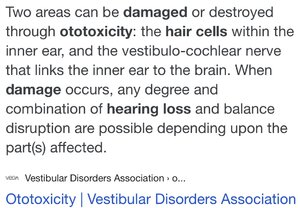Aren't they checking for tinnitus in phase 2a? If so, maybe it'll be approved also for tinnitus.What I'm worried about is health care providers not prescribing/recommending the treatment for those with tinnitus, but whose hearing tests come back fine. We all know that they don't tell us everything...
But that's a worry for the future.
Side note: I feel mean for saying this but I can't wait for audiologists to all go out of business xD

 Member
Member